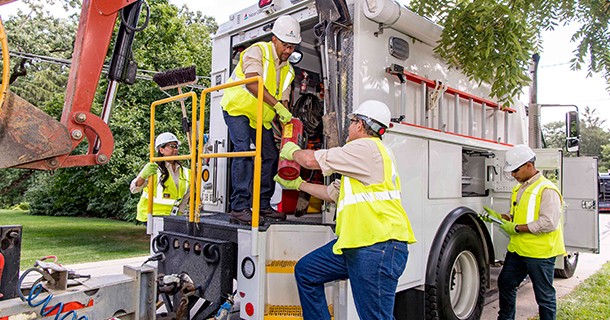Distribution Integrity Management Program (DIMP)
About
DIMP is a performance-based program that resulted from the Pipeline Inspection, Enforcement and Protection Act of 2006 (PIPES Act). Operators were given until August 2, 2011 to write and implement their Distribution Integrity Management Programs. Federal regulations require natural gas distribution operators to develop, write and implement an integrity management program plan with the following seven key elements:
- Understand system design and material characteristics, operating conditions and environment, and maintenance and operating history
- Identify existing and potential threats
- Evaluate and rank risks
- Identify and implement measures to address risks
- Measure IM program performance, monitor results and evaluate effectiveness
- Periodically assess and improve the IM program
- Report performance results to federal and state utility commissions
The Southern Company Gas DIMP team addresses the regulatory mandate by following the seven key elements, as well as, ensuring the integrity of all our distribution infrastructure by proactively identifying and addressing risks and threats through the following company initiatives:
Asset Protection Programs and Education
Asset Protection ensures compliance with federal, state and local laws in locating procedures, promotes watch and protect programs, and public awareness education about excavation safety. This includes supporting industry partners to promote calling 811 to request the locating of buried utility lines prior to the start of excavation projects to protect underground facilities from damages. Furthermore, the Asset Protection department serves as liaisons to business partners, municipalities, regulatory agencies, contractors and other stakeholder groups by providing damage prevention education. These actions help to protect underground facilities from damage and ensures safety for excavators, our customers and the general public.
Cross Bore Remediation and Elimination
The Cross Bore Program proactively works to identify and remediate cross bores that have occurred from past construction activities. Cross bores occur most often when natural gas pipelines intersect sewer and drainage facilities. The program continually reviews and implements new technologies and provides public awareness education to employees, contractors and plumbers to mitigate future cross bore damages.
Field Operations
Southern Company Gas provides safe and reliable natural gas delivery service to more than four million customers. In order to do so, the Distribution Integrity Department and Field Operations work together to develop a better understanding of system risks and have taken proactive steps in minimizing these issues. This has included developing customized training, in depth discussions of system risks with field operations employees, providing analytical support for integrity related items and establishing pipeline replacement initiatives.
Material and Component Testing and Investigations
Material and component testing and investigation proactively reduces risk and is an integral part of maintaining a safe and reliable gas distribution system. The Material and Standards Testing department is responsible for performing tests and inspections on inventory items critical to system safety and reliability to ensure that quality standards are met. Tracking the performance of company approved materials provides a means to develop corrective action plans which are distributed to targeted departments/personnel.




